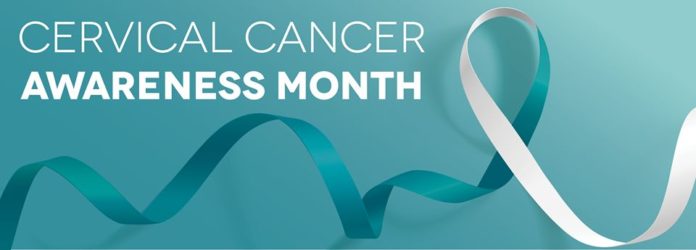MONTGOMERY, Ala. – During January, Cervical Cancer Awareness Month, the Alabama Department of Public Health (ADPH) wants to remind Alabamians that cervical cancer is more than 90% preventable. With improved education, access to gynecologic care, and most importantly – vaccination, cervical cancer can join other eradicated diseases of the past. When found early, cervical cancer is highly treatable and associated with high survival rates.
Almost all cervical cancers are caused by the human papillomavirus (HPV), a very common virus that 80% of women will be exposed to at some point in their lifetime. HPV is passed person-to-person through sexual contact. Because HPV usually does not exhibit any symptoms, it is possible to have HPV without knowing it, and to unknowingly spread the virus to others. Although men are not at risk for cervical cancer, they are at risk for other types of HPV-related cancers, including penile and oropharyngeal cancers of the neck, mouth and throat.
The risk of developing cervical cancer and other types of HPV-related cancers can be drastically reduced with a series of safe and effective vaccines that will protect women and men against the most common types of HPV and their related health problems. HPV vaccination could prevent more than 90% of cancers caused by HPV. The Centers for Disease Control and Prevention (CDC) Advisory Committee on Immunization Practices (ACIP) recommends that the ideal age to vaccinate is 11 and 12. ACIP also recommends HPV vaccination to include the “catch-up” age for both men and women age 18-26.
Recently the ACIP voted to expand the recommendation to also include older adults up to age 45 who had not been adequately vaccinated. Research has shown that older adults can still benefit by gaining protection against the HPV types to which a person has not been exposed.
Cervical cancer causes the death of about 4,000 U.S. women each year. According to data collected by the CDC, there are more deaths from cervical cancer in Alabama than in any other state in the nation. The average age of diagnosis tends to occur in women between the ages of 35 and 44. Many older women do not realize that the risk of developing cervical cancer is still present as they age; in fact, all women are at risk for cervical cancer.
State Health Officer Dr. Scott Harris said, “Because cervical cancer is over 90% preventable, it is important for women to take charge and be active participants in their own health. Both screenings and HPV vaccinations help reduce the risk of illness and death.”
To help prevent cervical cancer, the ADPH urges women to:
- Get vaccinated.
- Practice safe sex.
- Be smoke-free.
- Have routine Pap screenings.
- Ask for an HPV test with Pap smear for ages 30 and over.
- Watch for abnormal vaginal discharge and bleeding and seek immediate medical attention.
Every January the USA Health Mitchell Cancer Institute partners with several organizations, including ADPH, to launch the “Go Teal and White” statewide campaign in an effort to raise awareness about cervical cancer prevention and its impact on the state of Alabama.
The RSA Towers, along with other buildings throughout the state, were lit in teal and white Jan. 17.
The Alabama Breast and Cervical Cancer Early Detection Program (ABCCEDP) provides free cervical cancer screenings for women who meet eligibility guidelines. Through the Title X program, cervical cancer screening is also available in 83 county health departments across the state, as well as Jefferson and Mobile County Health Departments. For more information about free screenings, contact ABCCEDP toll-free at 1-877-252-3324 or contact your local county health department.
Visit these resources below for more information:



















